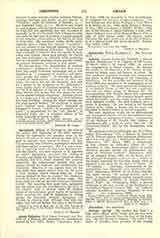

Agrippinus, Bishop of Carthage at the close of the second and beginning of the third century. During his episcopacy the question arose in the African Church as to what should be done with regard to converts from schism or heresy. If they had previously been Catholics, ecclesiastical discipline held them subject to penance. But if it were a question of receiving those who had been baptized outside the Church, was their baptism to be regarded as valid? Agrippinus convoked the bishops of Numidia and Africa for the First Council of Africa (probably 215-217); which resolved the question negatively. He consequently decided that such persons should be baptized, not conditionally but absolutely. Heretics, it was argued, have not the true faith; they cannot absolve from sin; the water in their baptism cannot cleanse from sin. These reasons seemed to him to warrant the conclusion arrived at, but it was not the Roman usage. The point, however, had not yet been raised and definitely settled. But assuming their good faith, Agrippinus and the others were not excluded from the unity of the Church. Half a century later, St. Cyprian speaks of the continuous good repute of Agrippinus (bonae memoriae vir); and St. Augustine in writing against the Donatists defends Agrippinus and Cyprian by showing that, although they were mistaken, they had not broken the unity of the Church.
JOHN J. A’ BECKET.

